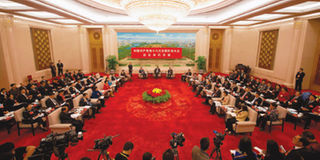New leadership in US, China to affect Africa

PHOTO | AFP Delegates hold a meeting in the Beijing room at the Great Hall of the People in Beijing. The week-long congress, held every five years, will end with a transition of power to Vice-President Xi Jinping.
What you need to know:
- Beneath the gigantic sickle and hammer that adorn the Great Hall of the People in Beijing, Mr Xi Jinping has been endorsed to take over as secretary general of the Communist Party of China when the party’s congress concludes on Wednesday
- The events in two of the world’s most powerful countries are expected to have far reaching ramifications on economies across the world
- China will most likely continue to cultivate stronger relations with the continent in an effort to tap into its natural resources
The United States last week re-elected Barack Obama to the presidency while China will be seeking to get a new leader in processes that are as different as the two countries are geographically removed from each other.
Beneath the gigantic sickle and hammer that adorn the Great Hall of the People in Beijing, Mr Xi Jinping has been endorsed to take over as secretary general of the Communist Party of China when the party’s congress concludes on Wednesday.
Next year, he will assume the presidency of the 1.3 billion people strong nation.
The events in two of the world’s most powerful countries are expected to have far reaching ramifications on economies across the world.
The direct impact of Mr Xi succeeding Mr Hu Jintao, China’s current president, commentators say, will be as subtle as the nuances of power play that surround his ascendancy, but no less powerful.
Mr Xi has been hobnobbing with local politicians for the last decade as vice-president of China. He knows China’s policy on Africa and is unlikely to change it dramatically over the next decade. In fact, he practically authored Mr Hu’s opening speech at the congress which emphasised the strengths of China’s status quo.
“He has already been in power for the last 10 years. I don’t expect anything new in terms of policy towards Africa or Kenya. However, he is a forceful, strong-minded character who might take issue with China playing second fiddle to the US in the global power arena,” said foreign affairs scholar, Prof Macharia Munene.
China will most likely continue to cultivate stronger relations with the continent in an effort to tap into its natural resources. However, its hunger for these resources may be tempered by the impact of Obama’s re-entry into the White House.
After the euphoria of his re-election, reality is starting to sink in. Mr Obama is facing a fiscal crisis that is threatening to send the US into recession and cause a contagion across the world.
The American ‘fiscal cliff’ has been making economists and policy makers quiver with anxiety.
In Tokyo, Japan last month, the International Monetary Fund (IMF) flagged it as one of the foremost risks facing the global economy while various G-20 leaders meeting in Mexico urged America to resolve the issue.
The ‘fiscal cliff’ refers to a set of new taxation measures and spending cuts that will come into effect in January 2013 if American lawmakers do not do anything to avert them.
Deadlocked congress
Studies by both US technocrats and the IMF have warned that if the measures are implemented in their totality, the country’s economy could experience negative economic growth rates of 2.0 per cent to 4.5 per cent.
The problem is a deadlocked congress. Republicans calling for tax breaks for the rich to be maintained while the Democrats seek to preserve earnings made by middle-income families. If policy makers fail to resolve the issue in time, it could have wide ranging repercussions across the globe.
“The economy of the United States is the largest in the world; it has links to the rest of the planet. So it would not only be bad for the United States, but for the global economy as well,” IMF managing director, Ms Christine Lagarde, told an American radio station in October.
West African states which rely on the United States for 25 per cent of their exports would be hit hard as consumption declines.
However, in Kenya, the US accounts for about 5 per cent of total exports which means the direct impact would be limited.
“The US fiscal cliff implies that sub-Saharan Africa economies that are big exporters to the US may experience slower demand in 2013,” reads a research note by Renaissance Capital.
The US is no longer Africa’s largest trading partner as the continent is growing cosier with its new leading trade partner, China.
But the Far East country is tied to the United States at the wallet and a slowdown in the American economy will impact negatively on China, and consequently also affect countries in Africa.
If consumption declines in the US, demand for Chinese goods will take the same trajectory.
China’s hunger for Africa’s natural resources, in turn, could also go down as its economy contracts.
Ratings agency Standard & Poor’s, in an August report predicted that softening growth in the Chinese economy will spell doom for African metal, mineral and oil exporters.
“If you look at the triangle, China has been very active in lending to Africa and exploiting Africa’s resources partly because of American consumption. In a worst case scenario, this triangle could collapse. It’s a contagion, what happens in the US will affect China and what happens in China will affect Africa,” said economist, Mr Robert Shaw.
He said that the impact would not be immediate and dramatic, but more gradual.
However, the situation does not necessarily have to be glum. Mr Shaw said that with the market for its goods declining in the US, China could increase its focus on Africa and foster more partnerships in an effort to cultivate new outlets.




